A well-designed youth development program can do wonders for the development of children and teens. However, development programs only really work if students can be engaged.
Today we'll discuss some tips for fostering genuine student learning in a way that keeps those same students excited about the process. We'll also talk about why that excitement is so important if you want your programs to do the best possible.
What Does Ideal Student Learning Look Like?
First, we want to discuss an important question every educator should be asking: What does ideal student learning look like? Even when we can't reach that ideal, we should understand how to get closer to it.
The simple truth is that many young people find the way educators often approach teaching them boring. The data also shows that this affects their ability to retain what they're being taught.
We often allow ourselves to be distracted by the fact that most students pass school. However, that shouldn't be the standard. The standard should be passing school, retaining what they were taught, and doing so in good mental health.
One method to help improve learning is to increase student involvement. Active learning has been shown to promote more positive outcomes. Students like learning through questions and conversation.
It's that last term we want educators to focus on when it comes to teaching: positive outcomes. The ideal student learning environment is the one that does the most good for the student's education and mental health.
What's great about an active approach to learning is it encourages social and emotional bonds to grow, even as it also makes learning easier. While there's no one-size-fits-all approach to learning, we think this approach in general works better than the standard one.
Why Youth Development Programs?
So in what ways can youth development programs get students engaged?
First, the right development programs help tackle problem behaviors in ways that don't feel like being lectured to. They can instead empower young people to make good decisions and even empower them to discourage others who are acting out of line.
This is more or less the primary goal of our Empowering Upstanders program and the fact is that it works. This school-based youth program makes students feel safer and the environment they're in a better one.
Second, many of these programs boost a student's confidence and overall energy in an environment that many find distressful. Many students suffer from disenfranchisement, low-self confidence, and more.
Educators can't pretend students exist in a bubble. They need to support youth regarding issues both in and outside the classroom. This is something that's very difficult to do without well-thought-out development programs.
By designing programs for youth (or allowing us to help), you can find a school-based approach that does wonders for youth and helps in strengthening communities in the process.
The Basics of a Strong Program
So what makes for a strong program that encourages students to be empowered and guides them to better overall life outcomes? It's a big question and one with an answer we need to think about.
It's our opinion, firstly, that a strong program has heavily involved youth in the process. The traditional approach to education simply allows for too many students to get lost in the weeds.
A program that promotes positive outcomes will have students readily able to ask questions. They will communicate with educators and each other on a regular basis.
That said, it isn't chaos, the educator still serves a critical role. Developmental programs will have set goals and educators are still trained. The difference is the use of newer, evidence-based teaching methods as appropriate.
When youth participate in these programs, the level of excitement with the material is often apparent. They feel more involved and thus often find it much easier to process lessons.
What Should Developmental Programs Focus On?
Traditional education has its flaws and students need developmental programs to help engage them. The open question is what your programs should look like.
You want programs that have the capacity for building the best results for your school's most important problems. What those problems are will vary; there's no one magic answer.
This is where a free consultation from experts in youth development can come in handy. Administration can discuss issues they notice in the school and walk through their day-to-day. Experts like ours can then tailor a program to the students' needs.
As these programs find success, a school can then expand its options, tackling more and more niche needs. The final goal is to empower as many students as possible to be their best selves.
While it's easy to think of developmental programs as another set of extracurricular activities, they're far more than that.
First, many programs work best integrated with the normal education process. Regardless, strong development programs produce real results. The trick is making sure your program is evidence-driven.
(Quality) developmental programs that tackle bullying reduce bullying. Those aimed at making kids feel empowered and meant to boost self-esteem do that. These are real issues that affect real children and programs help.
We'd Love to Work With You
Student learning works better if they can be engaged with youth development programs. Feeling more empowered in their education brings a myriad of benefits educators cannot ignore.
If you'd like to see those sorts of programs in your school, contact us. We can discuss what options you have and which would work best based on the school's situation, funding, staff, and available time.
No education center is perfect but there are always ways to improve. At The Leadership Program, we've made it our mission to help educators find ways to do just that.



Comments [0]
Click here to read/write comments